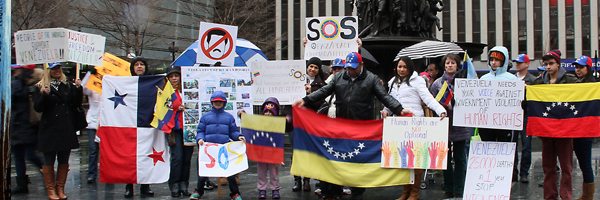A capital crisis
In the last few weeks, the protests in Ukraine have shocked the world, with images of chaos being shown around the world. Whilst the media wait to see what’s about to happen next, and the events are scrutinised by almost everyone, these are not the only protests taking place. On the other side of the world, Venezuelans have spent the last three weeks protesting some truly appalling problems, and yet, despite violence and shocking bru- tality, the coverage it has received is almost minimal.
The violence in Venezuela is a grossly unjust situation, as the protests there are just as important, and deserve the full scrutiny of the media. The protests, which have been taking place in Caracas (the capital) daily for the past three weeks, are mainly student-led, and have focused on relatively simple demands – an end to the crime wave which has swept Venezuela and more food availability. However, they have been quick to stress they are apolitical, and have fought to keep the protests that way. But ending these issues would be difficult. Venezuela is facing a projected inflation rate of 60%, one of the highest ever recorded, and there are widespread food shortages, particularly in Caracas. This has led to a crime wave of endemic proportions, with 24,700 Venezuelans murdered in 2013 alone.
The protests, which have been taking place in Caracas (the capital) daily for the past three weeks, are mainly student-led…
And so, on February 12, millions of students took to the streets of the capital – fittingly enough on Youth Day. Since then, both sides have tried to politicise them, either claiming them for their side, or rejecting them and demonising them. In particular, Maduro (the president) has expelled three U.S diplomats since the beginning of the conflict, blaming them for promoting the cause of the opposition. On the other side, opposition leaders have called more protestors to the street, and TV host Mario Lopez has even been arrested. And yet, both sides have missed the true purpose of the protests in their attempts to politicise them. And it is this politicisation that has led to the dramatic increase in violence and police brutality, with five dead and many more injured. In order for the students to achieve what it is they set out to do, they need to remain apolitical.
Luckily, for now they have managed to retain support amongst the majority of Venezuelans, but it is uncertain how long they will. With the conflict in its third week, there is a desperate need for the government to affect change and initiate talks with the protestors, and the world needs to stand up and take notice, otherwise these protests run the risk of fizzling out and becoming nothing more but an ugly scar on the history of Venezuela.
[divider]
Photo: flickr/dougwolf

Comments